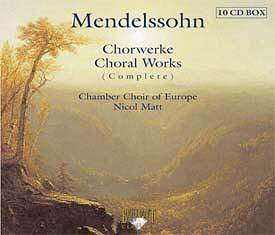This welcome issue
of nicely recorded recent performances
from Germany reinforces my view that
Mendelssohn is too often represented
by the same few pieces which are not
necessarily his best. Of course the
Scottish and Italian Symphonies, to
name but two examples, are splendid
works in their own right, but relatively
speaking they are over-played and over-recorded,
and the composer did better elsewhere:
in chamber music and in vocal works
such as these.
Yet this collection
is no more than a representative sample
of a field in which Mendelssohn was
prolific. Besides that there are the
larger works, such as the oratorios
and the setting of Goethe's Die erste
Walpurgisnacht. However, these smaller
pieces often find him at his most inspired.
Presiding over proceedings
is the accomplished conductor Nicol
Matt, who has an innate feel for balance,
tempo and phrasing. The recordings are
reliable and the sound is what we have
come to expect of recent recording equipment
and techniques.
While these compositions
are unlikely to rank among what we might
call ‘Mendelssohn’s major masterpieces’,
they show consummate taste and artistry.
Of course the quality is not necessarily
even, but it is always professional
and accomplished. Take, for example,
Lauda Sion, the composer’s largest setting
of a Latin text. The taste and artistry
are second to none, if the invention
is not necessarily the most penetrating,
The orchestral-vocal balances are beautifully
handled, and the performance is therefore
most rewarding.
The set claims to be
complete, and the unaccompanied Psalm
settings from 1830 show once again how
distinguished a composer was the young
Mendelssohn. The earlier still pieces
from the 1820s, such as the beautifully
contrived setting of the Gloria, confirm
this point more strongly still. If you
are looking for a child genius composer,
don’t look for Mozart, look for Mendelssohn.
An astonishing phenomenon, to be sure.
Perhaps some of the
more ambitious concepts find Mendelssohn
stretching to the limits of his inspiration
and technique, Opinions will vary about
the success of the Opus 42 Psalm setting
with which the set opens. The style
is urbane, the delivery sophisticated,
but are the ideas entirely penetrating?
The various solo singers
emerge from the ranks of the chorus,
as is appropriate. They are all talented
and musical: among the best performances
are those of the tenor Daniel Sans (the
Lauda Sion is particularly good) and
the bass Manfred Bittner, whose performance
of the aria in Psalm 115 is memorable.
The three Motets (disc
10) are particularly appealing, fresh
and direct, while other gems include
the Psalms for unaccompanied chorus
from Opus 78. There is some beautiful
invention here, and the understanding
of the inner workings of a chorus is
impressive and subtle.
The Chorale Cantatas
inevitably show the influence of Bach,
and several of their movements are reworkings
of Lutheran chorales that will be familiar
to today’s listener from their deployment
in the St Matthew Passion, as well as
in the English Hymnal. For this set
of seemingly unknown byways of Mendelssohn’s
prolific output is a treasury of fine
things. Of course it is intended as
a library addition rather than as essential
daily listening, but more than anything
else it goes to show the danger of thinking
that ‘music we don’t know is music we
don’t need to know’. This worthwhile
set enhances our understanding of Mendelssohn
as a great composer, and it deserves
praise for that worthy achievement alone,
though its strengths go beyond any single
dimension.
The packaging is well
organised, though the documentation
is uneven. Opus numbers are not always
listed, for example, nor are dates of
composition. The standards of presentation,
like the performances themselves, are
of a high order.
Terry Barfoot

